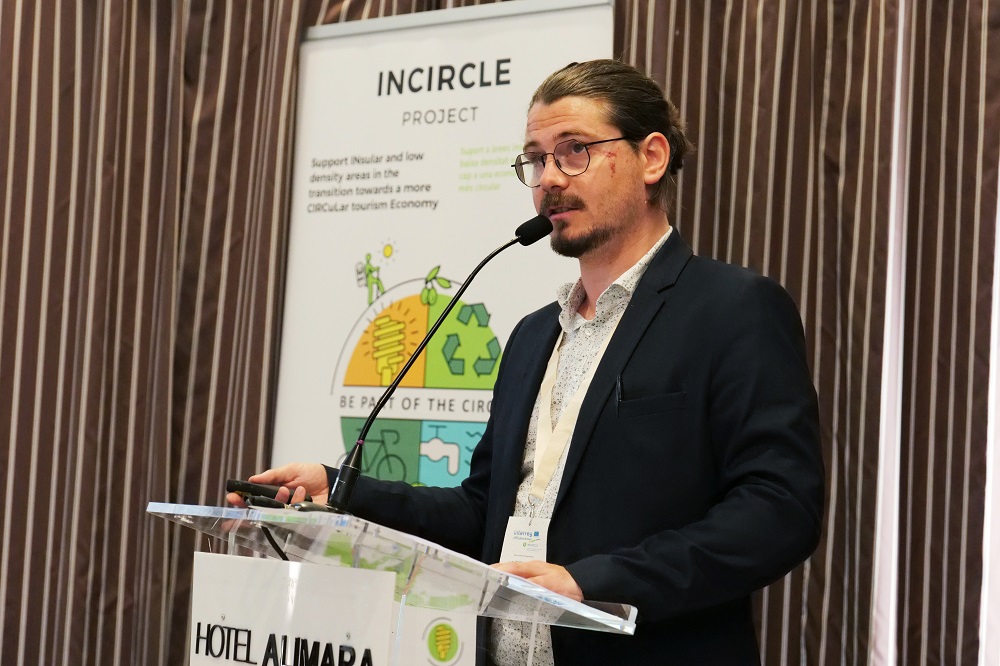
NECSTouR showcases good practices for the four pillars of InCircle
-
07/06/2022
-
Members
Thomas Guillot, project officer in NECSTouR permanent Secretariat, was invited to deliver a keynote on the “main bottlenecks and opportunities for Sustainable tourism in the Mediterranean” during the Interreg MED InCircle final event in Barcelona, taking place one day before the II MED Sustainable Tourism Convention.
The obvious choice was to present good practices focused on each of the four pillars of the InCircle project: Mobility, energy efficiency, use of limited resources and waste production.
You can find a selection of photos and presentations in their website.
Mobility
The first good practices related to the first pillar on Mobility is the project CIVITAS Destinations, funded through Horizon 2020. Especially in the Cretan city of Rethymno, the first Greek city to have electric mini-buses. The city aspires to promote electric mobility in combination with Renewable Energy Sources, via a pilot installation of photovoltaic shelters and charging stations for electric cars, bicycles and scooters in two important parking areas of the city. Those ideas and activities live on in the INCIRCLE project.
Then, Blue Ways, a good practice identified in the framework of Star Cities, this time launched by the Diputacio de Barcelona, the lead partner of our community and a NECSTouR member. Blue Ways (Vies Blaves in Catalan) is a project aiming to convert almost 300 km for bikers and hikers along the three main rivers of the province of Barcelona.
You can learn more about our mobility-related activities in our report of the Urban Transport community event in Brussels.
Energy Efficiency
For the Energy efficiency pillar, we talked about the former neZEH project, on the development of Net Zero Emission hotels in 16 pilot projects in 7 countries (Croatia, Greece, France, Italy, Romania, Spain, Sweden).
The website is still active with a lot of information, including A practical e-tool, for hotel owners to assess their energy consumption state and to identify appropriate solutions for improving energy efficiency. In fine, 56.000+ hotel owners were informed on the methodology and results available to any hotel for scaling up.
NECSTouR participated on the Policy intervention at EU and national level, elaborating position papers with recommendations for removing barriers and upscaling renovations towards Net-Zero Emission in the accommodation sector as a basis to fruitful debates in policy level also in the European Parliament.
Use of limited resources as water
NECSTouR organised a workshop on June 3rd 2021 during the last EU Green Week where partners and experts from the Interreg MED Sustainable Tourism horizontal project shared outputs and policy recommendations. The report and the video recording are still available on our website.
Present for InCircle final event, Vasileios Myriokefalitakis from the Municipality if Rethymno (Crete) was already connected to present the CASTWATER online tool from the eponymous project. An online tool addressed to both tourism sector SMEs and public authorities in the Mediterranean area to give them the support to understand, compare, assess, and rate their performance on water efficiency and water management. The tool will be exploited until the end of 2023.
Water management is a key challenge for tourism authorities and the tourism industry, especially in islands and coastal destinations like Crete. Not only to reduce the environmental impact but also to provide a healthier environment for everyone: tourists and inhabitants.
Waste production
Following a webinar in 2020 on “Initiatives Tackling the “Greening” Transition of Destinations” with Virginia Fernández-Trapa, Programme Officer Sustainable Development of Tourism in the UNWTO, the Balearic Islands presented their Law 8/2019 on Waste and Polluted Soils establishes the regulatory framework for waste with applications in the tourism industry, specially within the hospitality sectors.
The NECSTouR region has successfully developed a tourism circular economy strategy in the framework of the Interreg Med project INCIRCLE. You can find other examples in our padlet on the Initiatives Tackling the “Greening” Transition of Destinations.
In conclusion, NECSTouR finally adopted the document its Climate Action Plan.
This Climate Action Plan delivers on NECSTouR’s commitments as a signatory of the Glasgow Declaration, and aligns our actions with the EU Transition Pathway for Tourism and ‘Fit for 55’. Climate Action describes the efforts to measure and reduce Green House Gas emissions and strengthen adaptive capacity to climate induced impacts, and these efforts are strategically embodied by the delivery of detailed Climate Action Plans.